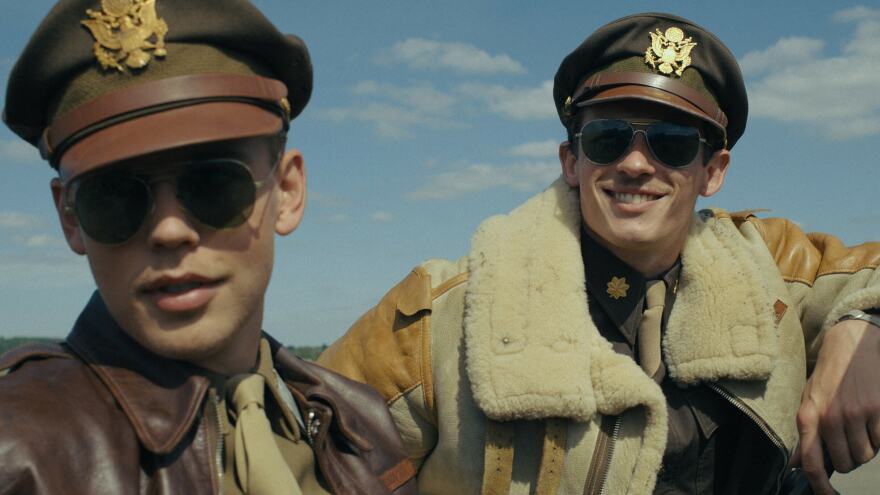In the 1990s, Steven Spielberg directed two unforgettably powerful films about World War II: Schindler's List, in 1993, and Saving Private Ryan, in 1998. Saving Private Ryan starred Tom Hanks, and Hanks and Spielberg weren't through with their obsession with World War II dramas; they were just beginning.
Teaming with Gary Goetzman, they produced two impressive, captivating HBO miniseries about World War II: Band of Brothers, in 2001, followed nine years later by The Pacific. Both miniseries did what Saving Private Ryan also had accomplished so brilliantly: They allowed the audience to experience the intensity and brutality of wartime. Not just allowed us, but forced us, in unrelenting battle sequences that gave new meaning to the phrase "you are there."
Those dramas also delivered large helpings of surprise, and of loss. We got to know, and care deeply about, their soldiers and marines — and then, without warning, many of them were taken away from us.
Masters of the Air is the newest entry in this World War II project by Spielberg, Hanks and company. It's every bit equal to, and boasts precisely the same strengths as, those previous offerings. It's presented by Apple TV+ this time, rolled out weekly after the Jan. 26 two-episode premiere. And because Masters of the Air, like Band of Brothers and The Pacific, is a limited miniseries, even the main characters are at risk of dying at any time — and some do.
Two of the primary characters share a similar nickname – a confusing gimmick that's explained early on. There's Gale "Buck" Cleven, played by Austin Butler, and John "Bucky" Egan, played by Callum Turner. Bucky had the nickname first, and gave the shorter name, "Buck," to his friend just to annoy him – until it stuck. Bucky is a loudmouth hothead; Buck is more quiet and private. But they're good friends, and great pilots.
Butler empowers Buck with the undeniable charisma of an old-fashioned movie star, like a bomber pilot-James Dean. Butler's breakout starring role was as Elvis Presley in Elvis, and here, even without the trappings of show-biz flash and glitz, he's just as magnetic.
But Butler's not carrying this story, or fighting this war, alone. Turner's Bucky matches him throughout — and so does Anthony Boyle, who plays a young navigator named Harry Crosby. And a lot more players contribute greatly: This is a large cast, doing justice to a very big story.
Masters of the Air is based on the book by Donald L. Miller. Several talented directors traded off working on various episodes, but all were adapted for TV by screenwriter John Orloff. His narrative not only follows the leading characters during World War II, but makes time, over its nine episodes, to weave in such familiar wartime narratives as the Tuskegee Airmen and the Great Escape. Lots of time is spent airborne, in one thrilling mission after another, but there also are scenes set in briefing rooms, barracks, rest and recreation spots, even German prisoner of war camps.
Masters of the Air finds drama in all those places. And it's nice to know that this miniseries, like its predecessors, is being rolled out in weekly installments. These hours of television are like the Army Air Forces' missions themselves: They're such intense experiences, it's nice to have a little time between them to reflect ... and to breathe.
Copyright 2024 Fresh Air. To see more, visit Fresh Air.



